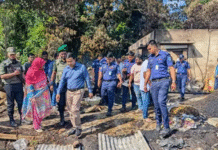
As Bangladesh has 54 shared rivers across the borders with India, water is a key concern.
Following bilateral meetings between Prime Minister Sheikh Hasina and her Indian counterpart Narendra Modi, the Indian Ministry of External Affairs recently released a ‘shared vision for the future’ of Dhaka and Delhi to enhance “connectivity, commerce and collaboration for shared prosperity.”
Water sharing comes in Article 6 of this shared vision.
It mentions two things: The formation of a joint technical committee to “initiate discussions” for the renewal of the Ganges Water Sharing Treaty of 1996; and undertaking conservation and management of Teesta River inside Bangladesh with Indian assistance.
Bangladesh’s river specialists and diplomats who have followed both the critical Teesta water sharing treaty — which was never signed despite discussions having begun since 1951 — and the talks surrounding the renewal of the Ganges treaty are not very optimistic about the new discussion solving old grievances.
How critical is West Bengal’s role in the treaty?
The Indian discussion about the management of Teesta inside Bangladesh and the increasing absence of the water-sharing issue on the agenda raises concerns that Teesta water-sharing talks are fading. Besides, the Ganges treaty renewal issue was also mentioned several times in the previous years without bringing any results.
Moreover, West Bengal Chief Minister Mamata Banerjee is already campaigning against any deal regarding the Ganges just the way she did with the Teesta. If you ask her about it, she would perhaps reply the same way she did back in 2015, “Please keep faith in me” and that we “don’t worry about” Teesta water.
Though a more reasonable Jyoti Basu in West Bengal and Deve Gowda in the centre played a role in brokering the 1996 Ganges deal, giving so much importance to Mamata is irrelevant, according to water resource and climate change specialist Professor Dr Ainun Nishat, because the discussion is between two independent countries and not between two Indian states.
The other experts we interviewed agree regarding the irrelevance of Mamata in Bangladesh-India deals unless the Indian central government wants this to be an excuse to dodge the deal; the Indian constitution’s Article 253 enables the union government to override the state government when it comes to issues involving transboundary rivers.
Technical ails
Nishat also questioned the idea of conservation of Teesta’s water in Bangladesh when the country is deprived of its fair share of water.
“You are saying there is plenty of water all across the year, which needs to be conserved. Now where should this be conserved? In the upstream, which means Sikkim or nearby Darjeeling in West Bengal. Bangladesh is flat… So when you are saying that water be conserved inside Bangladesh, what will you conserve?” he asked.
“There is zero water during the dry season. India withdraws all the water from Gajoldoba. But it cannot happen that Bangladesh’s share is zero. The 700/800/1,000 cusec water that comes to Bangladesh to the Dalia point, if this is all to be conserved, if this is all that Bangladesh has in its share, what is the point of going to India, or China for that matter?” Professor Nishat added.
“If the survey finds that there is water in the monsoon in Bangladesh which needs to be preserved, I suspect the Indian representatives will say on the first day to do whatever can be done only within Bangladesh. Then there is nothing to discuss,” added Nishat, who was involved with the Ganges treaty in the ’90s.
Diplomat Humayun Kabir, former deputy high commissioner of Bangladesh in Kolkata, said that discussions surrounding the Teesta water-sharing deal have been continuously growing lighter.
“As a citizen, my share of river water is my right,” he said.
According to the former diplomat, this is not only about the Teesta. With the recognition of Teesta water sharing, the same principle will be applied to the other 53 shared rivers between Bangladesh and India.
“The river water is an existential problem. We depend on river water to halt the sea in the south. If our rights on the Teesta are not recognised and established, there is a fear of losing our rights from the entire set of 54 rivers,” he said.
“For that recognition, the water sharing treaty is essential and then will come the issue of management. Water distribution and water management are not the same thing. We should look at the two different things from two different perspectives, based on their merits. When these two mix, it sets off an alarm, and that is why people are raising questions. It is not wise to think common people do not understand,” he said.
The Ganges saga
Sheikh Rokon, the founder and secretary of Riverine People, extensively writes about Bangladesh’s river rights issues.
The joint technical committee formed over the Ganges treaty renewal issue is nothing new, according to him. When Sheikh Hasina visited India in 2017, 2019 and 2022, this was discussed more or less in a similar context.
“The issue is about renewing the Ganges deal and about political goodwill,” Rokon said. “In one of the articles I wrote before, I mentioned that during the conversation of renewing the deal this time, Uttar Pradesh, Bihar and West Bengal might make an issue. And that is what is happening now.”
When asked if he fears that the renewal might be delayed or get disrupted given the internal issues of India unfolding with Mamata’s objections, he said “I did express that suspicion in my writings.”
Rokon further explained that when it comes to international treaties, it is all about the central government of India and the other countries — the question of Dhaka and Delhi. The Kolkata question is an internal issue, which, by no means, should be a concern for Bangladesh.
He does not think that an internal issue of India is such a significant hurdle in bilateral deals because when the CAA and NRC were implemented, some states raised objections, but the centre did not care.
“When the land boundary agreement was ratified in the Indian Lok Sabha, the Assam MPs objected. So what? The centre did it. Mamata is India’s internal issue. This is entirely about political goodwill and about Dhaka-Delhi international norms,” Rokon said.
Humayun Kabir, however, advises caution over the internal politics in India.
“From the last 12 years of experience, we know whether this is positive or negative. Our Teesta issue has been stuck for 12 years for India’s internal issue. If we get the same signal now, it is not difficult to understand how it unfolds. I think we have to think deeply here,” the diplomat said.
A triangle of Bangladesh, China and Indian diplomacy
China has long been involved in studies regarding the plans with the Teesta basin. Ever since President Xi’s visit in 2016, they have engaged in the discussion of water management of Teesta, one of the key rivers of Bangladesh.
India naturally does not like Chinese involvement in its neighbourhood. At the same time, the discussion regarding the water-sharing treaty was perennially stuck with Mamata’s excuses.
India expressed their interest in the Teesta management project in recent times. And during Sheikh Hasina’s latest visit, it was discussed on an official level. This turns the Teesta basin in Bangladesh into a playground for diplomacy between the three countries.
Mohammad Azaz, chairman of the River and Delta Research Centre (RDRC), sees an opportunity in the diplomatic tussle. He said that the people on Teesta Bank are victims of sudden floods and river erosion. Teesta, in places, is four to five kilometres wide. This happened due to irregular water flows, which is a genuine problem. There are local demands that this problem come under some sort of management.
“Water management and water sharing are two different issues. But eventually, they will merge,” Azaz said.
Implying Chinese involvement in the project, Azaz said, “We have been continuing the Teesta discussion for over 50 years solely depending on India. If a geopolitical spice is brought to this project, it could be interesting.
“In the last two Hasina-Modi discussions, we did not see Teesta on the agenda. But India is now showing interest in the management project. Involving China in this project was a strategic move and for that, India is showing interest and eventually water-sharing discussion will automatically begin,” he said.
On hurdles being posed by Mamata, Azaz is also of the opinion that she is no issue if India really wants it. “India didn’t want to sign it so they used Mamata as an excuse,” Azaz said.
Humayun Kabir said when it comes to the triangle of two big powers on Bangladeshi turf, Dhaka is the decision maker. “Everyone may show interest in working here. Nothing wrong with proposals. It is on me – if I can make the right decision, I will be benefited. And if I cannot make the right call, then I will lose,” he said.
However, last week, Prime Minister Sheikh Hasina’s press conference somewhat leaned toward India. “I do not tend to favour any country over another,” she said, but added, “if we implement the Teesta project with India, we will not have to face problems regarding water every day. We will have that benefit.”
The premier, however, is also scheduled to visit China soon.
Tbs









